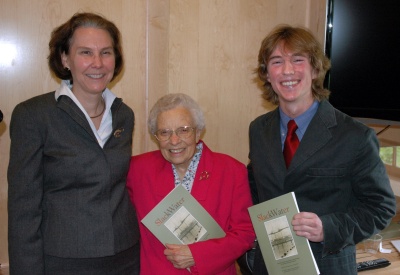
SMCM Associate professor of anthropology Julia King (left), director of the SlackWater Center, is pictured with contributor Catherine “Kitty” Barnes and student editor Zach Pajack ’09 during the release of the newest SlackWater edition. (Submitted photo)
ST. MARY’S CITY, Md. (June 13, 2009) — The sixth volume of SlackWater was released recently at St. Mary’s College of Maryland (SMCM), chronicling cultural and environmental changes in Southern Maryland. The journal, titled “The Instant City,” explores the social, political, and economical impact of the 1960s and ‘70s on the region through stories, interviews, historical photographs, and artwork contributed by people from the community who lived through that formative era of rapid growth. The civil rights movement, women’s rights, Vietnam, the space race, a growing environmental awareness, counterculture, and rock and roll music are among the many narratives of the changing tidewater region told throughout this volume.
The issue is available for $17.95 in the Campus Bookstore and online at www.smcmbooks.com.
Speaking about the Southern Marylanders who contributed their stories to the book, student editor Zack Pajack ’09 said, “Several lifelong residents of Southern Maryland who we asked to look over the stories told us that this is the first SlackWater to make them cry….Oral history narratives told by Southern Marylanders Emma Hall and Fred Talbert, as well as a poem by St. Mary’s College Professor Emeritus and former Maryland Poet Laureate Michael S. Glaser, for instance, tell of the pains and triumphs of overcoming segregation, of staying hopeful and strong in the pursuit of dreams and equality. Stories by Vietnam veterans Frank Maio and the late J. Abell Longmore, Jr. tell, respectively, of the horrors of war and the difficulties of re-acclimating to Southern Maryland after the return home.”
Among the stories appearing in the volume is that of Fred Talbert. Talbert, who passed away in 2004, worked at the PAX River Naval Air Station, and was also a Civil Rights activist who worked to ensure that public accommodations, such as restaurants, hospitals, and theaters, were open to African Americans, as required by Maryland’s Open Accommodations Law and the Civil Rights Act of 1964. At the time these laws were rarely enforced in the area, and African Americans were prohibited from entering such establishments through the front door. “Black people went around in the emergency department to get admitted to St. Mary’s Hospital,” Talbert said in an interview in 1991, reprinted in this volume of SlackWater. “Then, when you went to visit somebody, you had to go up the fire escape on the outside.” When the hospital wanted to construct a new wing, African Americans from across the region came together and made a donation to the hospital—on the condition that they would be permitted to enter the hospital through the front entrance like everyone else. “The black people, you know, they paid their share of it. So they put the new wing on,” Talbert said. This is only one of several stories he shares in the interview.
Another article in the journal recounts the 1968 legal battle between St. Mary’s County residents and Steuart Petroleum, in “what a local paper at the time called one of the most bitterly fought controversies St. Mary’s County has ever seen.” The petroleum company sought to build a major refinery on Piney Point, on the Potomac River, and promised to bring in more jobs and tax benefits to the region. Citizens worried about the ecological impact of the refinery, particularly the consequences of unchecked industrialization on the local fisheries. According to the article, co-written by Kirk Davis and Julia King, director of the SlackWater Center, “Citizen outrage—fueled by the tenacious reporting of the local media—forced Steuart to back off and, in late 1969, the company withdrew its application to the Department of the Interior.”
SlackWater is a publication of the SlackWater Center of St. Mary’s College of Maryland, created in 1998 by then-professor of English Andrea Hammer. The Center brings together students, faculty, and community members to explore some of the major issues facing the southern Maryland community today at the dawn of the 21st century. Previous issues of SlackWater have explored the tobacco buyout, the decline of the oyster economy, and the question of what being rural means to people living here. The Center maintains a large oral history archive and actively trains students in community research. Students write and edit many of the articles published in the journal. Associate professor of anthropology Julia A. King serves as the director of the SlackWater Center.


